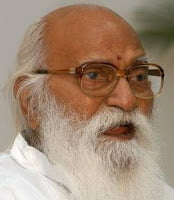- Nanaji Deshmukh was born in 1916 in a Marathi family in Maharashtra. As a child, he was inspired by freedom fighter Bal Gangadhar Tilak.
- Nanaji Deshmukh had been a member of RSS, which is the BJP’s ideological mentor. He had worked as the RSS pracha-rak in Uttar Pradesh.
- As a social activist, he laid emphasis on education. He established first Sarswati Shishu Mandir at Gorakhpur in 1950.
- Nanaji Deshmukh also took part in Jai Prakash Narayan movement during the Emergency.
- Nanaji Deshmukh had won in the 1977 Lok Sabha election from Balrampur.
- He quit politics in 1980 and resigned as a member of parliament.
- He was nominated to Rajya Sabha by the government in the year 1999 in recognition of his services to the nation.
- He was awarded Padma Vibhushan in 1999. He died in 2010.
















